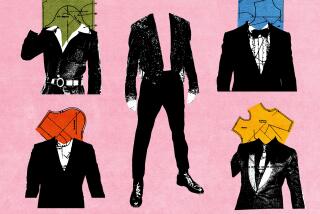The <i> Real</i> Mr. T : American Culture Is Writ Large in Radio Deejay’s Shirt Collection
- Share via
It all started with a simple bit of perverseness.
San Francisco deejay Carter Smith decided that it was foolish for radio stations to give away freebies, and he told his listeners so.
“I said, ‘The Bible says it’s more blessed to give than to receive. Why don’t you give things to me ?’ A T-shirt showed up and I acknowledged it on the air, and then another one showed up.”
That was 20 years ago, and T-shirts have been showing up ever since. So many have shown up, in fact, that they’re stuffed in rolls of 50 in countless plastic garbage bags under his Tiburon house. Smith, 56, wears a T to work every day and he swears he’s never worn the same shirt twice. His collection is so impressive that the Smithsonian Institution has dibs on it.
Clocking in at 4,300, Smith’s collection may just be the world’s largest, in his estimation.
“There was a woman who wanted to use my T-shirt collection as her master’s thesis in librarianship at the University of California,” Smith says. “She wanted to categorize the shirts, which would be fascinating, but I didn’t want her crawling around with the spiders in the subbasement of my house.”
Smith’s T trove is like a wearable index of American pop culture. He has cookie shirts, political shirts, fire department shirts, X-rated Mitchell Bros. shirts, military shirts, music shirts and that sartorial staple, running shirts.
Some of his more distinctive Ts are a custom shirt for a research organization conducting magnetic studies in Antarctica and a University of Colorado shirt commemorating Alferd Packer Day, which he says honors America’s only convicted cannibal.
Another shirt was so unexpected that it caught the eye of the CIA.
“I was running in a KGB shirt and was stopped on the running path by a man who said, ‘Where the hell did you get that shirt?’ ” Smith says. The T wasn’t exactly Russian intelligence issue, and Smith gave the grateful G-man the name of the American company that would send him one too.
In fact, Smith has never met a shirt he didn’t like, or that he wouldn’t wear. As an equal-opportunity T-man, he wears shirts of competing political candidates and just about any philosophical view.
“T-shirts are almost a library of what people are thinking about, how they relate to their world and how they relate to each other,” Smith says. “It is without a doubt one of the most significant expressions of our times.”
More to Read
The biggest entertainment stories
Get our big stories about Hollywood, film, television, music, arts, culture and more right in your inbox as soon as they publish.
You may occasionally receive promotional content from the Los Angeles Times.










